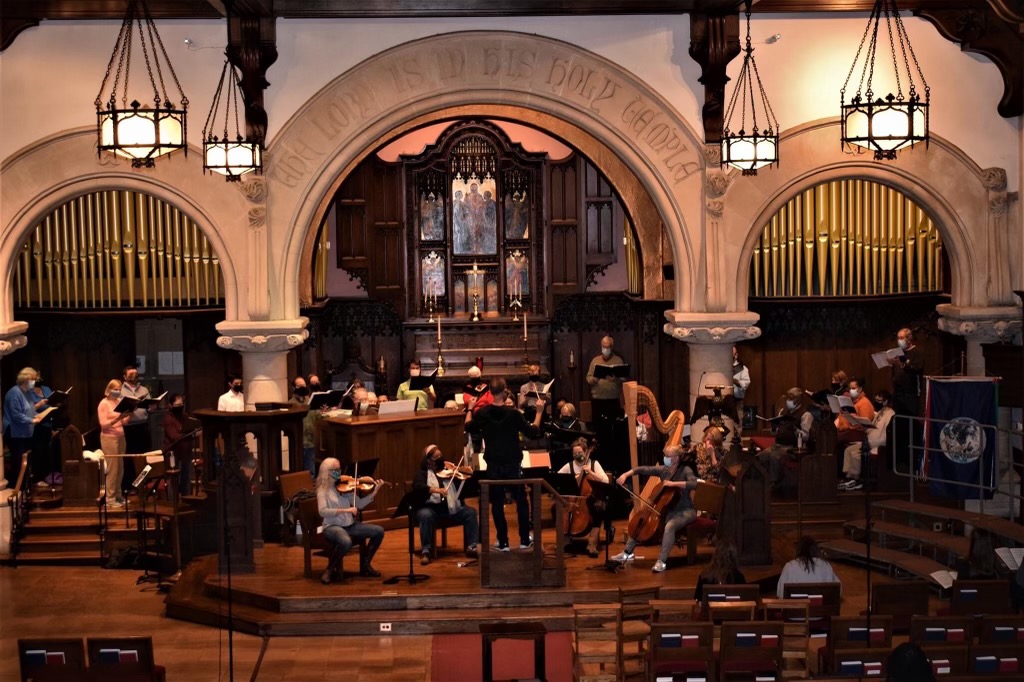A Heart for Concerted Action: Reflections Midway through COP26
By the Rev. Canon Martha Kirkpatrick, Canon to the Ordinary, Episcopal Church in Delaware
When events converge, I figure the cosmos is speaking to me and I try to listen harder. Something is “going on.”
It is Sunday morning, November 7. COP26 began a week ago. As a member of the Presiding Bishop’s Delegation to the United Nations’ 26th Conference of Parties to the UN Framework Convention on Climate Change, also known as “COP26” in Glasgow I have work to do. Every morning I rise at 4:45 Eastern (3:45 this morning), make my coffee, settle into my chair and turn on my computer. Bleary eyed and bewildered, I spend the next several hours absorbing the depth, scale and urgency of the planetary crisis, which is also a humanitarian one at a rate and level of suffering that is unprecedented. Complex issues arise at every level. Phrases like global asset management, green energy fund, commodities and trade, climate data, loss and damage, adaptation, resilience, mitigation, land-based solutions, rattle around in my brain. I try to absorb, to find the coherent thread that will guide me when the conference is over.
Every morning at 8 AM (EST) the Presiding Bishop’s delegation (and anyone else who wants to join us) gathers in prayer for 15 minutes, reflecting together on a chosen word like “reverence,” “sorrow” and “honesty.” It is profound and nourishing. We gather again at noon for a “daily huddle,” where we share experiences and ask questions. Compline is at 8 PM. We are building community.
I tried to clear my calendar of all other work for these two weeks, but I had made a commitment to sing with Delaware Choral Arts, and we had a concert Saturday evening, November 6. This meant extra rehearsals in this first week of COP26, getting home at 9:45 PM, a good hour past when I had hoped to be in bed. As Bishop Marc observed at one point this week: “sleep deprivation is serious.” And yet, singing in a choral group touches different parts of my heart, mind and body. It is feeding this climate work in ways I cannot explain but I know are real.
It was a short concert, sung with masks on. We performed five pieces, joined by several instrumentalists as well as young singers from the Wilmington Children’s Chorus. The central piece was the Faure Requiem, that sublime meditation on eternal rest and consolation, that ends “may the angels guide you into paradise.” “Before I finish this sentence,” one climate activist observed this week, “someone on the planet will die from impacts of climate change.” We sang two spirituals, “Fix me, Jesus,” and “Walk Together, Children,” along with “Roll Down, Justice!” and Sibelius’ “Onward, Ye Peoples!” These pieces express grief and loss in sorrow for the world and call on God to strengthen and renew us as we come together to work for justice and peace.
I would say I am an average volunteer choral singer. I don’t get (and don’t want) solo parts, and I am not good enough to be a section leader. So it is easy for me to imagine that I could be absent and would not be missed. And yet I know my voice matters. So I discipline and concentrate my energies to bring what I can to the work of the whole. The music is just characters on a sheet of paper until we incarnate it and bring it into being. Our hearts, minds and bodies come together, guided by the conductor, so that the voices of young and older, vocal and instrumental, blend and we make music as one. We are more together than any one of us can be alone.
At COP26 I am focused on the conversation around a keyword “adaptation.” Adaptation is code for the reality that global climate change impacts are a daily reality for poorer, low-lying developing countries in the southern hemisphere, and that those impacts will continue even if we were to stop all greenhouse gas emissions tomorrow. The need is urgent: climate change is felt through food insecurity, drought and flooding, and increasing conflict over scarce resources. The impact of climate change is killing people; lands and cultures are disappearing. It is also a reality that adaptation has been neglected in climate conversations, and that needs to change at this meeting in Glasgow. Listening to these conversations, hearing the urgency in the voices of peoples from these countries, seeing videos of flooding, drought, deforestation, and destruction, I’ve come to understand, in a way I haven’t before, that adaptation is fundamentally a matter of justice.
As with choral singing, it is easy for me to wonder what difference I can make in the face of the vastness and scale of the climate crisis. And yet I know in the deepest parts of myself that this is Christ-centered work that I am called to do. The Episcopal Church is doing what the church does best, and in this sense it is like a concertmaster. It convenes us — across continents, young and older, in our diversity — uniting us in one vision and purpose grounded in the life and witness of Christ Jesus. The Church enables us to join our voices together, amplifying them in prophetic witness and gospel proclamation. And it gathers our disparate energies of heart, mind, and body into effective, concerted action on behalf of God’s creation. We are all in this together. Thanks be to God.
Walk together, children. Don’t you get weary. There’s a great camp meeting in the promised land.

Photo above shows the Rev. Martha Kirkpatrick rehearsing with Delaware Choral Arts at the Episcopal Church of Saints Andrew and Matthew in Wilmington Delaware.
The Rev. Canon Martha Kirkpatrick has served as the Canon to the Ordinary for Vitality and Renewal for the Episcopal Church in Delaware since since May 2019. She is on the Board of Delaware Interfaith Power & Light, and one of the Episcopal Presiding Bishop’s Delegates to COP26. Read more at: iam.ec/COP26.

